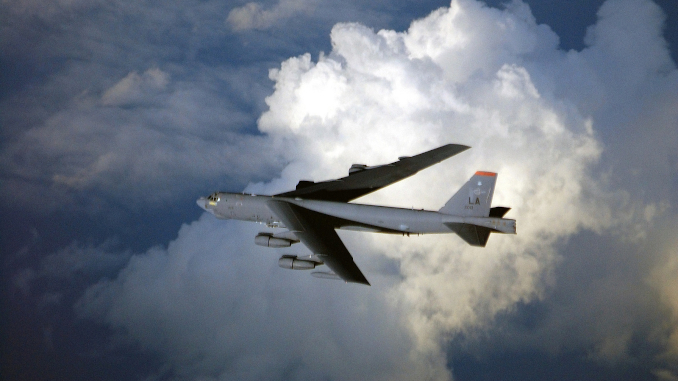
By Phil Giraldi
President Joe Biden has only been in office for five months, but he is already demonstrating a national security policy that leans strongly towards proactive use of military force in doubtful situations. For the second time, he has ordered a U.S. bombing raid on two targets in Syria, and for the first time, he also attacked a site inside Iraq. According to one report, at least seven Iraqis died in the attacks that targeted alleged weapons storage facilities along the Syria-Iraq border belonging to Kata’ib Hezbollah and Kata’ib Sayyid al-Shuhada militias. The U.S. claims that the two Iraqi militias have ties to Iran.

After the attacks carried out by U.S. fighter-bombers, the excuse provided was the same one employed after Biden’s first air attack in February, namely that the U.S., as described by Pentagon spokesman John Kirby, “conducted defensive precision airstrikes against facilities used by Iran-backed militia groups in the Iraq-Syria border region.” He added verbiage what has now become a regular feature of all U.S. military actions, that “the United States acted pursuant to its right of self-defense.” For those who are intrigued by Pentagon newspeak the expression “defensive precision airstrikes” has to be considered to be an exciting new development.
The interesting aspect of this latest bombing is that the initial government justifications for the action were on the vague side. Reportedly, someone had used drones with explosives attached for mostly night-time attacks directed “against places where Americans were located in Iraq,” which were further described as including diplomatic, intelligence and military facilities. The Pentagon refers to the drones as “unmanned aerial vehicles” or UAVs. No Americans were killed in the alleged attacks and there were no reports of any substantial damage, though the Pentagon is apparently collecting information and preparing a comprehensive report which the public undoubtedly will not be allowed to view.
Oddly, the initial media reporting on what had occurred and who had been blamed for it included a weasel word, “suspected.” In government-speak that means there was little or no evidence that the militias that had been targeted were actually the perpetrators, but it is convenient to assume that they are responsible. After all, it is relatively easy to transport a number of drones on the bed of a pickup truck, drive with it to a location where one is unlikely to be observed and then release them at a fixed target. Even if you don’t hit anything, you will spread fear and trigger a response that might well be exploited to vilify the occupying forces.
The Iraqi government, which was not informed in advance of the U.S. bombings, reacted strongly, registering its opposition to such activity on the part of its so-called ally, though occupier has been suggested as a more appropriate description. Prime Minister Mustafa al-Kadhimi’s office called the airstrikes a “blatant and unacceptable violation of Iraqi sovereignty and Iraqi national security.” After the assassination of Gen. Qasem Soleimani at Baghdad Airport in January 2020, the Iraqi Parliament had called for the departure of all U.S. forces, but the Trump administration ignored the demand, claiming that it was in Iraq to help the Iraqis in their fight against ISIS and other terrorist groups. The U.S. currently has a claimed 2,500 soldiers in Iraq who, it asserts, are in the country advising and training their local counterparts. It is roughly the same excuse that has been used to justify remaining in Syria, i.e. fighting terrorists and training friendly militias, where the U.S. has been helping itself to the production of the country’s oil fields, which it then provides to Israel. The U.S. is also, by the way, trying to overthrow the legitimate Syrian government in Damascus, using some of the very terrorists it claims to be fighting to do the job.
If the United States government is beginning to sound a bit like the Israeli government, that should surprise no one, as Israel is clearly America’s dominant partner in terms of what goes vis-à-vis Syria and Iran directly and in Iraq by proxy. One almost expects new Israeli Prime Minister Naftali Bennett to provide an endorsement, parroting the Pentagon line as well as his own country’s rhetoric, saying “the U.S .has a right to defend itself.” Of course, the unasked question then becomes “to defend itself against what”? Israel was at least able to pretend that there was some kind of threat coming from Gaza since the two share a border, but the United States would be hard pressed to explain why it has soldiers in Syria and Iraq at all, particularly since the Iraqi government has called upon them to depart.

I believe someone, possibly a neocon, once quipped that the nice thing about having an empire is never having to say you’re sorry, but that doesn’t mean that mindless acts of violence inflicted throughout the Middle East are consequence free. One has to suspect that the use of force to include a target within the borders of a nominal ally was also intended to send a signal to Iran. A Pentagon spokesman ironically boasted afterward that “This action should send a message to Iran that it cannot hide behind its proxy forces to attack the United States and our Iraqi partners.” The spokesman appears to be oblivious to the fact that it was Iraqi militiamen tied to the government that had been killed, not Iranians.
The strikes were in fact executed a week after Iran elected an alleged hardliner, Ebrahim Raisi, as its next president. To underline its message to the new government in Tehran, the Biden administration has also blocked internet access to a large number of websites it had linked to Iran.
Sending a message to Iran would also tell the Iraqi government that drawing any closer to the Iranians is too close, as far as the Pentagon and White House are concerned. In terms of the timing of the airstrikes, it is also important to note that the U.S .has been working closely with the new Israeli government to establish a unified policy on Iranian “regional aggression” and its nuclear program. Biden met recently with retiring Israeli President Reuven Rivlin at the White House and Secretary of State Antony J. Blinken has been having discussions with Israeli Foreign Minister Yair Lapid. Iran was the focus of both meetings.
So, Joe Biden and whoever is advising him are continuing down the path that began with George W. Bush, with military action used as a substitute for any real foreign policy. The problem with the meddling in the Middle East is primarily that it permits no exit strategy. It will end ignominiously when it ends as is happening in Afghanistan, without any remorse and little to show for all the expense and death. Rather than concoct largely fabricated reasons to keep U.S. troops in Iraq and Syria the Biden administration should be looking for ways to end the torment for everyone involved. And it should do so right now.
Philip Giraldi is a former CIA counter-terrorism specialist and military intelligence officer and a columnist and television commentator. He is also the executive director of the Council for the National Interest. Other articles by Giraldi can be found on the website of the Unz Review.

